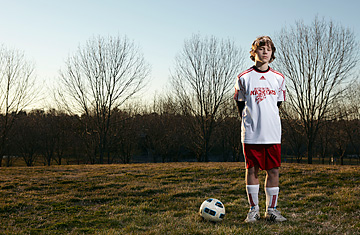
Virginia killed a bill that would have let homeschoolers like Nick Faulconer play on public high school teams
(2 of 4)
More telling, in some ways, is the pushback coming from fellow homeschoolers. Parents who teach their kids at home are bitterly divided over the athletics issue, which has emerged as a proxy battle for how much of the movement's effectiveness--and even its identity--depends on keeping themselves apart. Homeschooling is facing a potential transformation as it gains mainstream acceptance and grows beyond its base of parents who passionately reject everything about public education. Many of the newcomers like the la carte approach to public schools--take an AP class! try out for the orchestra!--while the pioneers worry that greater integration could lead to more regulation.
"We asked 20 years ago to be able to do our own things," says Chris Davis, a devout Christian and father of three homeschooled children in Linden, Va. "Now they're saying, 'Let us back in.' As soon as you do that, [the government is] going to start asking something of you."
Davis, who works in the tech industry, runs a homeschool sports league in his free time and encouraged its members to lobby against Virginia's homeschool sports-access bill. In a letter to the legislation's sponsor, Davis pointed out that Virginia's homeschoolers have three tackle-football teams for high schoolers, a statewide track meet and an East Coast basketball tournament with more than 80 teams. "Any homeschool parent in Virginia that can't seem to find an organization or team," he wrote, "is just misinformed, lazy or not trying very hard." Of course, in a state in which it can take eight hours to drive from end to end, three football teams is not a lot.
An Issue of Fairness
Back in 1925, with the Ink Barely dry on compulsory-education laws in several states, the Supreme Court ruled parents could not be required to send their children to public school, solidifying the legal status of private and parochial schools. But homeschooling remained a largely underground phenomenon until the 1960s and '70s, when supporters began pushing for laws that dozens of states passed in the '80s and '90s. The few states that still lack homeschool statutes allow individuals to teach at home under private-school laws.
An entire industry has emerged to provide curriculum and resources to homeschool parents, who often band together to teach. "I do science, English and history," says Melissa Ryan, a co-op member and mother of three in Pullman, Wash. Her primary reason for homeschooling is to teach her children--the oldest of whom is 10--her Christian values. "In public schools, students get really lost, with so many outside influences and a lot of pressure they don't need to deal with," she says. That's why Ryan is not interested in having her kids enroll part time in public school. At the same time, though, she notes that her local school district gave her pointers on how to get her daughter assessed for dyslexia. "Teachers in our area are really helpful," she says. "They have not closed doors to us."
